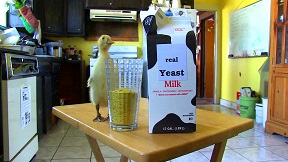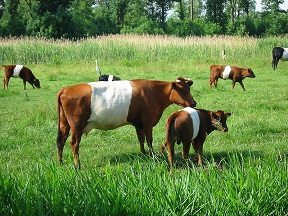Synthetic biology offers us a countless number of opportunities to reshape natural materials, and even our food. Yes, that would mean synthetic food. Many people would dismiss this right away as a viable opportunity, but it might be worthwhile to investigate the case for it. Could synthetic food reshape the way we produce and consume our meals?
This is the fourth article in a series on public acceptance of biotechnology in food production. The articles appeared on 18 February, 2 March, 3 March, 10 March, 15 March and 27 March.

One start-up in this field is Muufri, a company founded by vegans who aim to develop a cow-free milk. ‘Our solution is to make real milk from the bottom up,’ says Muufri on its website. ‘It’s a fairly simple mixture: six key proteins for structure and function, eight key fatty acids for flavour and richness. In different ratios, these components give us cow’s milk, goat’s milk, or even buffalo milk – all suitable to become countless products, from toppings to cheeses to desserts. Using the same principles of biotechnology behind beer or vegetarian rennet, Muufri will make milk that tastes and functions just like animal-produced milk, but without the problems associated with industrial animal facilities.’
Biotechnology is part of our food system already
Muufri here makes a point that is worthwhile considering: biotechnology started entering our food system several decades ago. Beer producing companies now use biotechnological yeasts, and most of our cheese is produced using biotechnological rennet. There are several advantages to this, all valued by consumers. Yeasts and enzymes can be tailored to specific uses, thereby allowing the development and production of special beers and cheeses. And unlike natural yeasts and rennet, these biotechnological products can be produced in a pure form and do not carry unknown impurities with them. In all these processes, the biotechnologically designed organisms do not show up in the product – unlike with genetically engineered rice or soy. Consumers have accepted these beers and cheeses. The difference with synthetic food like Muufri’s milk seems to be marginal.

And inter alia, Muufri made another point. Synthetic milk could circumvent the environmental problems associated with milk production. Dairy cows produce methane gas in a quantity that makes a considerable contribution to the greenhouse effect. Questions of animal welfare will not arise with synthetic milk. And less agricultural land may be needed to produce synthetic milk from sugars and vegetable oils.
Synthetic food, even better than the natural stuff?
It would seem that ‘vegan’ would imply to include a preference for ‘natural’. Many people who embrace ‘natural’ tend to resist GMO technology, particularly when it comes to food. But the Muufri people embrace technology and combine that with their vegan diet.
Muufri even suggests that their synthetic food could be better than the natural stuff. ‘We don’t just solve problems’, they say, ‘we add new value to dairy, too. Because we choose what goes into our product, we can choose to leave out lactose, which is at least partially indigestible by 75% of adults; and we can choose to leave out bad cholesterol for a much healthier product. And because our products are made with the same precision as medicines, they’ll be free of all bacteria – meaning a great-tasting milk with unprecedentedly long shelf life, no pasteurization needed.’
And for those who still would prefer the natural brand: what is the difference between this synthetic milk and the product we offer to our little children, the baby milk powder that is engineered just as carefully? Synthetic food is an area that is just opening up. We should better start to become aware of its implications.
